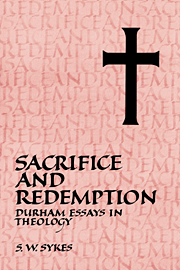Book contents
- Frontmatter
- Contents
- List of contributors
- Prefatory note
- Introduction
- PART I
- 1 Sacrifice and holiness
- 2 Sacrifice and world order: some observations on ben Sira's attitude to the temple service
- 3 Paul's understanding of the death of Jesus as sacrifice
- 4 Hebrews: the final sacrifice
- 5 St Athanasius on Christ's sacrifice
- 6 The doctrine of sacrifice: Augustine and the Latin patristic tradition
- 7 Sacrifice in the early East Syrian eucharistic tradition
- PART II
- PART III
- PART IV
- Index of biblical and ancient references
- Index of persons
5 - St Athanasius on Christ's sacrifice
Published online by Cambridge University Press: 10 March 2010
- Frontmatter
- Contents
- List of contributors
- Prefatory note
- Introduction
- PART I
- 1 Sacrifice and holiness
- 2 Sacrifice and world order: some observations on ben Sira's attitude to the temple service
- 3 Paul's understanding of the death of Jesus as sacrifice
- 4 Hebrews: the final sacrifice
- 5 St Athanasius on Christ's sacrifice
- 6 The doctrine of sacrifice: Augustine and the Latin patristic tradition
- 7 Sacrifice in the early East Syrian eucharistic tradition
- PART II
- PART III
- PART IV
- Index of biblical and ancient references
- Index of persons
Summary
Though St Athanasius did not write a special treatise on Christ's sacrifice, the theme is central to his thought, especially to his teaching concerning the saving work of Christ. This is apparent in his early apologetic work De Incarnatione, but it also appears in his other writings wherever he deals with the salvation which has been granted by God in Christ, particularly through Christ's death and resurrection.
This fact has not escaped the attention of modern patristic scholars who have dealt with Athanasius’ soteriology. Many have commented on it, though their conclusions to a certain extent have varied, especially with regard to particular aspects of this doctrine. Such have been the aspects which relate to the rationale of Christ's sacrifice (God's justice, law, character, love, etc.), the nature of it (substitutionary, vicarious, representative, etc.), the precise identity of the recipient of it (death, the Father, evil powers), the connection of it with such traditional notions as those of a ‘debt’ or a ‘ransom’ which have to be paid so that mankind's redemption might be secured, and so on. I shall refrain from saying anything about these conclusions, until we have conducted a fresh examination of the relevant Athanasian texts.
The close study of the Athanasian texts reveals that, broadly speaking, there are three kinds of sacrifices which Athanasius discusses: the pagan, the Jewish and the Christian. For Athanasius, as for all the theologians of the Church who preceded him, the Christian sacrifice, which, in his thought, is primarily connected with Christ's death upon the cross, is clearly distinguished from pagan and Jewish sacrifices, from the former in a more radical and from the latter in a more moderate way.
- Type
- Chapter
- Information
- Sacrifice and RedemptionDurham Essays in Theology, pp. 73 - 100Publisher: Cambridge University PressPrint publication year: 1991
- 1
- Cited by

